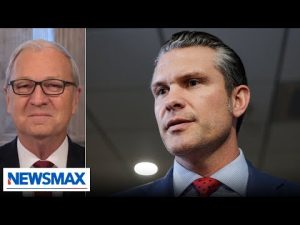**Navigating the Lawfare Labyrinth: A Pathway Toward Justice**
In a political landscape that often feels like a never-ending game of legal dodgeball, the concept of “lawfare” has emerged as a troubling trend. It refers to the use of legal systems to achieve political ends, a tactic frequently employed by certain factions within the political sphere. Recently, Dr. Matthew Mean, an associate dean and assistant professor of government at Hillsdale College, shared insights on how the GOP can pave the way to genuine justice amidst this chaotic swirl of courtroom drama and political gamesmanship.
Dr. Mean pointed out that confronting this lawfare phenomenon is no easy feast. Imagine trying to grab a slippery eel while standing on a rolling boat. Addressing the wrongdoings of political opponents—who may have indeed committed serious offenses—requires a delicate balance of justice and perception. If Republicans pursue accountability exclusively, it could easily appear as a politically motivated pursuit. However, there’s hope for a path forward that creates both accountability and an appearance of fairness—essential for rebuilding public trust.
So, what’s the proposed game plan? Dr. Mean highlighted the importance of addressing the crime of perjury. Sworn testimonies are the backbone of legal proceedings, and when individuals mislead under oath—be it in court or during congressional hearings—they threaten the integrity of the system itself. Advocating for a robust approach to perjury prosecutions might just be the key to dismantling the machinery of lawfare. By ensuring that honesty holds sway—even among political rivals—the tables could turn on those who seek to weaponize the law for personal gain.
One pivotal tool mentioned was Executive Order 14157, aimed at ending the weaponization of the federal government. Under the directive, the Department of Justice is encouraged to scrutinize all instances of legal overreach, ensuring transparency and fairness. It’s a clever move to also focus on cases involving both Democrats and Republicans. This signals a commitment to a nonpartisan effort to clean up the legal mess that has plagued recent political history. Highlighting the challenges faced by Democrat Mayor Eric Adams of New York serves as a prime example. In trying to rectify mismanaged immigration policy, the administration can deftly sidestep charges of political favoritism.
Yet, Dr. Mean didn’t shy away from the more challenging aspect of accountability—the prosecutors themselves. How should the GOP address those legal figures who may have mishandled cases or breached ethics? It’s a sticky situation. Despite the risks, Dr. Mean suggested focusing on indisputable cases of misconduct. If the wrongdoing is glaringly obvious, it could provide the grounds for investigations without the appearance of a political vendetta. Establishing a priority on clearly defined cases, built on factual evidence rather than allegations, paves the way for a more substantial argument for accountability.
Ultimately, the aim is to cultivate an environment where truth reigns supreme. The overarching goal is not merely to wage wars on political rivals, but to reclaim a politics of good faith. While a perfect world may be an elusive dream, striving towards a culture of honesty can help restore faith in the political process. As the GOP maneuvers through these turbulent waters, emphasizing truth-telling—especially amidst the ongoing chaos of lawfare—may be the best course of action for a healthier democracy.
In these challenging times, refreshing notions of justice and accountability can seem rare. However, by leaning into the principles of transparency and honesty, there exists a glimmer of hope for restoring confidence in not only the judicial system but the entire political arena. If the GOP can navigate this path successfully, perhaps we can all hold our heads a little higher—whatever color tie we choose to wear.



